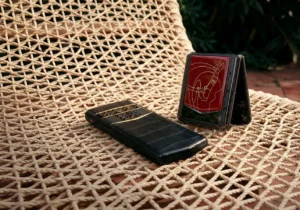In an era where our smartphones are digital extensions of ourselves, the paramount importance of securing our personal and professional data has never been more critical. With the digital landscape of 2025 fraught with evolving cyber threats, a phone with military-grade encryption is no longer a niche gadget but an essential tool for anyone serious about privacy. This comprehensive guide will navigate you through the world of encrypted phones, offering actionable insights to help you choose the perfect digital fortress for your needs.
Why a Phone with Military-Grade Encryption is Non-Negotiable in 2025
The increasing frequency and sophistication of data breaches and cyber-attacks have made robust digital security a primary concern for individuals and organizations alike. Standard smartphones, while offering some security features, can still be vulnerable to advanced hacking methods. Military-grade encryption, on the other hand, provides a formidable defense, converting your data into an indecipherable code that is virtually impossible to crack. This ensures that your sensitive information, from private conversations to financial details, remains protected from unauthorized access, even if your device falls into the wrong hands.
The market for encrypted phones is experiencing significant growth as more users recognize the need for enhanced privacy. This trend is driven by a heightened awareness of surveillance and the value of personal data. Future predictions indicate a continued rise in demand for secure communication solutions, making phones with military-grade encryption a cornerstone of modern digital life.
Top Encrypted Phones of 2025: A Detailed Comparison
Navigating the landscape of secure smartphones can be daunting. To simplify your decision-making process, here's a detailed look at some of the top contenders for the most secure phones in 2025.
For the Ultimate Security Purist: Purism Librem 5
The Purism Librem 5 stands out for its unwavering commitment to privacy and user control. A key feature is its hardware kill switches, which allow you to physically disconnect the camera, microphone, Wi-Fi, and cellular modem. This provides a level of assurance that software-based solutions cannot match. Running on the open-source PureOS, the Librem 5 is designed to be transparent and free from the tracking often associated with mainstream operating systems.
For the Demanding Professional: Bittium Tough Mobile 2C
Engineered for governmental and enterprise use, the Bittium Tough Mobile 2C offers a unique dual-boot system. This allows users to maintain two completely separate operating systems on a single device, one for personal use and another for highly sensitive work. Its security is further bolstered by a tamper-proof design and end-to-end encrypted communication capabilities.[
Mainstream Options with Robust Security
For those who prefer a more conventional user experience without compromising significantly on security, several mainstream options offer robust protection:
-
Apple iPhone Series: Apple has built a strong reputation for user privacy. iPhones come with end-to-end encryption for iMessage and FaceTime, and the hardware is designed with security at its core. Regular software updates ensure that devices are protected against the latest threats.
-
Samsung Galaxy Series with Knox: Samsung's high-end smartphones are equipped with the Knox security platform, which provides multi-layered security from the hardware to the application level. Features like the Secure Folder allow you to keep sensitive files and apps in an encrypted space.
-
Google Pixel with GrapheneOS: For the tech-savvy user, installing the privacy-focused GrapheneOS on a Google Pixel phone creates an incredibly secure device. GrapheneOS is a hardened version of Android that removes Google services and adds numerous security enhancements.
How to Choose the Right Encrypted Phone for You
Selecting the ideal encrypted phone depends on your individual needs and threat model. Here are key factors to consider:
-
Encryption Standards: Look for phones that utilize strong, industry-recognized encryption standards like AES-256.
-
Operating System Security: A hardened and regularly updated operating system is crucial. Consider whether a mainstream OS like iOS or a privacy-focused one like PureOS or GrapheneOS better suits your needs.
-
Hardware Security Features: Physical kill switches, tamper-resistant hardware, and dedicated security chips offer additional layers of protection.
-
App Ecosystem: If you rely on a wide range of applications, a mainstream option like an iPhone or a Samsung Galaxy device might be more practical than a phone with a more limited app ecosystem like the Librem 5.
-
Ease of Use: Security should not come at the cost of usability. Choose a device that you are comfortable using for your daily tasks.
Encrypted Phones Comparison Table
| Feature | Purism Librem 5 | Bittium Tough Mobile 2C | Apple iPhone (Latest Model) | Samsung Galaxy (with Knox) | Google Pixel (with GrapheneOS) |
| Primary Focus | Ultimate Privacy & User Control | Government & Enterprise Security | User-Friendly Security | Mainstream with Enhanced Security | Hardened Android Security |
| Key Security Features | Hardware Kill Switches, Open-Source OS | Dual-Boot OS, Tamper-Proof | End-to-End Encryption, Secure Enclave | Knox Security Platform, Secure Folder | Hardened OS, Exploit Protection |
| Operating System | PureOS (Linux-based) | Hardened Android & Secure OS | iOS | Android with Knox | GrapheneOS |
| App Ecosystem | Limited | Standard Android | Extensive | Extensive | Limited (by design) |
| Ideal User | Privacy Purists, Journalists, Activists | Government Officials, Corporate Executives | Everyday Users, Professionals | Business Users, Android Enthusiasts | Security Researchers, Privacy Advocates |
Frequently Asked Questions (FAQ)
1. What is military-grade encryption?
Military-grade encryption typically refers to the AES-256 standard, which is an extremely strong encryption algorithm used by governments and high-security organizations worldwide to protect classified information. It is considered virtually unbreakable by brute force methods.
2. Do I need an encrypted phone if I use secure messaging apps?
While secure messaging apps with end-to-end encryption protect your communications within that app, an encrypted phone protects all the data stored on your device, including photos, files, and other app data. For comprehensive security, an encrypted phone is highly recommended.
3. Are encrypted phones difficult to use?
While some specialized encrypted phones may have a steeper learning curve, many, like iPhones and Samsung Galaxy devices, are designed to be user-friendly while still offering strong security features. The choice depends on balancing your security needs with your desire for convenience.
Who Should Use an Encrypted Phone?
-
Business Professionals and Executives: To protect sensitive corporate data and communications from corporate espionage.
-
Journalists, Activists, and Lawyers: To safeguard confidential sources and sensitive case information.
-
Privacy-Conscious Individuals: Anyone who values their digital privacy and wants to protect their personal information from being collected and exploited.
-
Government and Military Personnel: For secure communication in sensitive and high-stakes environments.









